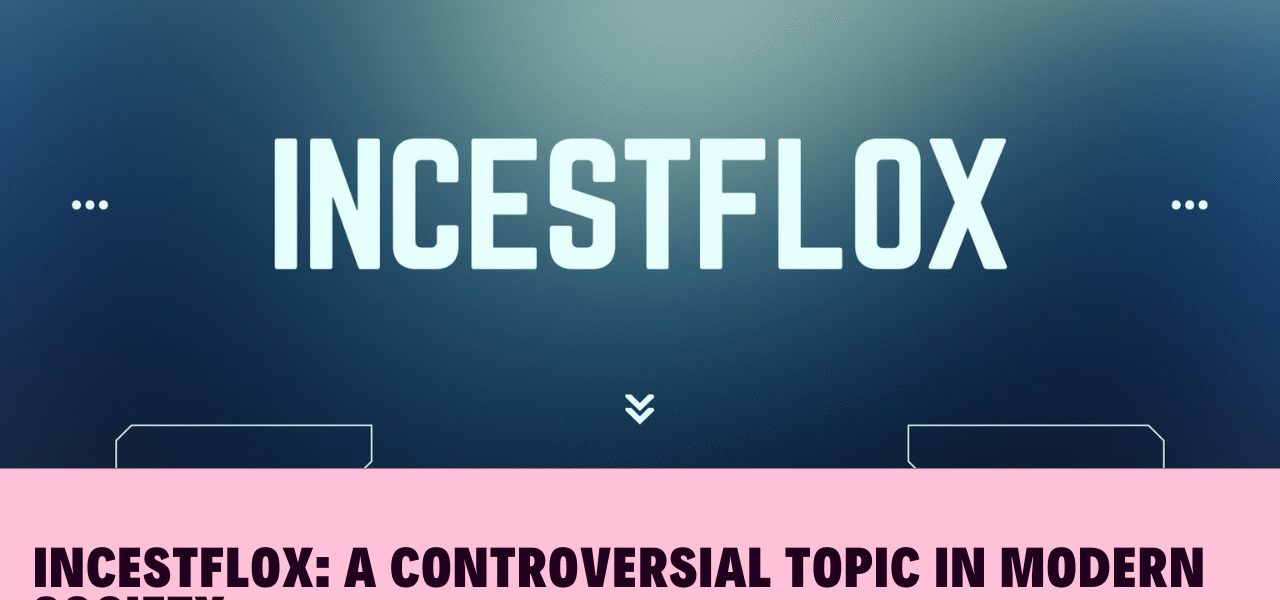Introduction to Incestflox and its Controversy
In recent years, the term “incestflox” has emerged as a provocative topic sparking heated discussions across various platforms. This controversial notion challenges societal norms and provokes deep-seated emotions. As we navigate through this complex subject, it’s essential to unpack what incestflox truly means and why it has captivated public attention.
For many, the word “incest” conjures up images of taboo relationships fraught with moral dilemmas. But what does incestflox add to this narrative? Is it just a new label for an age-old issue, or is there something more significant at play? Delving into its definition reveals layers of historical context and modern implications that are worth exploring.
Join us as we dissect the ethical debates surrounding incestflox, examine legal ramifications, and consider how these relationships affect individuals and families involved. Let’s open the door to an honest conversation about a topic often shrouded in silence and stigma.
Understanding the Definition of Incest
Incest refers to sexual relationships between closely related individuals. This includes familial connections such as parent-child, sibling-sibling, and other direct blood relations. Societies worldwide have distinct definitions based on cultural norms and legal frameworks.
The taboo surrounding incest stems from a mix of moral, ethical, and biological concerns. Many argue that such relationships can lead to harmful genetic consequences for offspring due to the limited gene pool.
Understanding incest involves navigating complex emotional landscapes too. Relationships within families can be fraught with power dynamics that complicate consent.
In many cultures, these bonds are seen as sacred or protective spaces where love should flourish without boundaries. The clash between societal expectations and personal desires creates a rich tapestry for discussion around this subject.
Historical Perspective on Incestflox
Throughout history, incest has been viewed through various lenses. In ancient cultures, it was often intertwined with royal bloodlines and the pursuit of power. Pharaohs in Egypt frequently married close relatives to maintain their lineage.
During the Middle Ages, societal norms shifted dramatically. The Church imposed strict prohibitions on incestuous relationships, viewing them as sinful and damaging to family structures. This led to severe penalties for those who defied these rules.
In more recent times, modern psychology began examining the impacts of such relationships on individuals and families. Studies explored genetic risks while also highlighting complex emotional dynamics within familial bonds.
The evolution of perspectives showcases a significant cultural shift towards understanding rather than outright condemnation. As society progresses, conversations around taboo topics like Incestflox have begun to emerge from shadows into public discourse.
The Ethical Debate: Arguments for and Against Incestflox
The ethical debate surrounding Incestflox is deeply polarizing. On one side, proponents argue for personal freedom and autonomy. They believe that consensual relationships between adults should not be stigmatized, regardless of familial ties.
On the opposite end, opponents express concerns about power dynamics and potential coercion within these relationships. They emphasize the psychological implications and risks involved when family members engage in intimate connections.
Moreover, there are arguments regarding genetic consequences for offspring resulting from incestuous unions. Many fear that this could lead to increased health issues in future generations.
Cultural norms also play a significant role in shaping opinions on Incestflox. Societies have long maintained strict boundaries around familial relationships due to historical precedents and moral frameworks. These perspectives continue to influence public discourse today.
Legal Implications and Current Laws on Incestflox
The legal landscape surrounding Incestflox is complex and varies significantly across jurisdictions. In many countries, laws explicitly prohibit incestuous relationships due to concerns about family dynamics and potential genetic implications. These laws often extend to consensual adult relationships as well.
In some regions, the penalties for engaging in such relationships can be severe, ranging from fines to imprisonment. This strict regulation stems from historical attitudes toward familial bonds and societal norms that prioritize nuclear family structures.
Despite these prohibitions, certain advocacy groups argue for reforming these laws. They believe consenting adults should have the right to engage with one another without state intervention. This perspective raises questions about personal autonomy versus societal values.
Several cases of individuals challenging existing laws have sparked discussions in courts around the world. However, legal acceptance remains a contentious issue fraught with moral dilemmas and public opinion battles.
Impact on Individuals and Families Involved in Incestuous Relationships
The impact of incestuous relationships on individuals and families is profound and multifaceted. Those directly involved often grapple with intense emotional conflicts. Feelings of love can intertwine with guilt, leading to a complex psychological landscape.
Families face unique challenges too. Trust may erode, creating rifts that are difficult to mend. Relationships within the family unit can become strained, as members react differently to the revelation or existence of such ties.
Children born from these unions often bear an additional burden. They may deal with societal stigma and discrimination from peers and institutions alike. This reality further complicates their development and sense of identity.
Support systems often struggle to understand these dynamics fully, leaving affected individuals feeling isolated. The need for compassionate dialogue becomes paramount in addressing these intricate issues without judgment or prejudice.
Addressing the Taboo: Initiatives for Open Discussions about Incestflox
Addressing the taboo surrounding Incestflox requires courage and openness. Many feel isolated when grappling with such complex issues. Initiatives that encourage dialogue can help break down these barriers.
Community forums and support groups provide safe spaces for individuals to share their experiences without fear of judgment. These platforms foster understanding and empathy, allowing participants to explore their feelings in a constructive manner.
Educational programs also play a crucial role. By integrating discussions about Incestflox into school curricula or workshops, we can equip future generations with knowledge, reducing stigma associated with this topic.
Media representation has shifted as well. Documentaries and podcasts dive deep into personal stories, humanizing those involved in incestuous relationships. This helps challenge preconceived notions while promoting compassion over condemnation.
Encouraging open conversations creates pathways toward healing for all parties affected by Incestflox, paving the way for more informed perspectives in society.
Conclusion: Moving
The topic of Incestflox continues to stir strong emotions and provoke deep discussions across society. As we navigate the complexities surrounding this issue, it’s clear that understanding is crucial. The historical context shows us how societal norms have evolved, while current laws reflect ongoing debates about morality and legality.
Engaging in conversations about Incestflox can help dismantle stigmas. It allows individuals to share experiences, challenge perceptions, and explore the psychological impacts on those involved. Open dialogues can pave the way for a more nuanced understanding of personal relationships and their implications.
It remains essential for society to approach these sensitive topics with care. By fostering respectful discussion rather than judgment, we create opportunities for empathy and awareness around complex issues like Incestflox. Embracing open-mindedness may lead us toward a future where such subjects are addressed thoughtfully rather than shunned or ignored.




